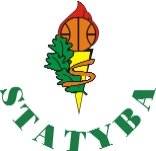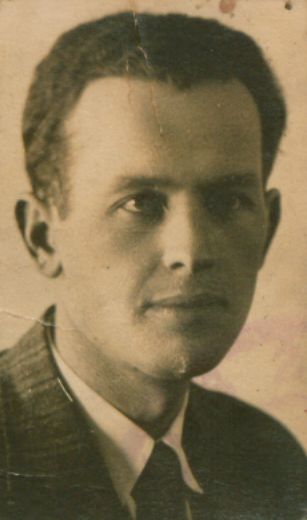Related Research Articles

The Lithuanian Soviet Socialist Republic, also known as Soviet Lithuania or simply Lithuania, was de facto one of the constituent republics of the Soviet Union between 1940–1941 and 1944–1990. After 1946, its territory and borders mirrored those of today's Republic of Lithuania, with the exception of minor adjustments to its border with Belarus.

"Tautiška giesmė" or "Lietuvos himnas", also known by its incipit "Lietuva, Tėvyne mūsų", is the national anthem of Lithuania. The music and lyrics were written in 1898 by Vincas Kudirka, when Lithuania was still part of the Russian Empire. The fifty-word poem was a condensation of Kudirka's conceptions of the Lithuanian state, the Lithuanian people, and their past. Shortly before his death in 1899, the anthem was performed for Lithuanians living in Saint Petersburg, Russia.

Jonas Vailokaitis was a Lithuanian banker and industrialist. He as his brother Juozas Vailokaitis (1880–1953) were widely regarded as the richest men in interwar Lithuania. He was one of the twenty signatories of the Act of Independence of Lithuania.

The Supreme Soviet of the Lithuanian SSR was the supreme soviet of the Lithuanian SSR, one of the republics constituting the Soviet Union. The Supreme Soviet was established in August 1940 when the People's Seimas declared itself the provisional Supreme Soviet. According to the constitution it was very similar to modern democratic parliaments: it was elected every four years and had the power to create, amend and ratify the constitution, laws, and treaties and appoint officials in the Council of Ministers. However, in reality the elections were staged, the Soviet had very little actual power and carried out orders given by the Communist Party of Lithuania (CPL). The situation changed in 1988, when the Lithuanians began seeking independence from the Soviet Union. The political power shifted from CPL to the Soviet, which adopted a number of important constitutional amendments and laws, paving the way for the independence. The first free elections were held in February 1990 and were won by pro-independence Sąjūdis. During its first session the Supreme Soviet adopted the Act of the Re-Establishment of the State of Lithuania and renamed itself the Supreme Council of the Republic of Lithuania.
Vytautas Kubilius was Lithuanian literary critic and political activist.
Bronius Vyšniauskas was a Lithuanian sculptor. He was an Honored Art Worker of the Lithuanian Soviet Socialist Republic (1963), People's Artist of the Lithuanian SSR (1973), and a recipient of the Lithuanian SSR State Prize (1973).

BC Statyba was a basketball club from Vilnius, Lithuania. It was renamed to Lietuvos rytas in 1997.
Tiesa was the official daily newspaper in the Lithuanian SSR. Established in 1917, the newspaper soon became the official voice of the Communist Party of Lithuania. After the Lithuanian victory in the Lithuanian–Soviet War, the party and the newspaper were outlawed in Lithuania. Thereafter, it was first printed in exile and later illegally in Kaunas. Tiesa survived irregular publishing schedules, frequent relocations, staff changes, and other difficulties and, after the Soviet occupation of Lithuania in June 1940, became the official daily of the new communist regime. At its peak, its circulation exceeded 300,000 copies. After the collapse of the Soviet Union, Tiesa lost its official status and its circulation shrunk. The publication was discontinued in 1994.
The Council of Ministers of the Lithuanian SSR or Council of People's Commissars in 1940–46 was the cabinet of the Lithuanian SSR, one of the republics of the Soviet Union. Its structure and functions were modeled after the Council of People's Commissars and Council of Ministers of the Soviet Union. The Council consisted of a chairman, first vice-chairman, vice-chairmen, ministers, and chairmen of state committees. The council's chairman was equivalent to a prime minister and was second in rank after the First Secretary of the Communist Party of Lithuania.

Juozas Balčikonis Gymnasium is a secondary state school located in Panevėžys, Lithuania. Teaching started in 1727, however, school reorganised to gymnasium in 1858, making it the oldest gymnasium type school in Lithuania. Juozo Balčikonio gimnazija is always one of the top-ranked institutions in the Lithuania for the high quality of its teaching, long lasting traditions and notable alumni.
Algimantas Anicetas Bučys is a poet, prose writer, translator, literary theorist, historian and critic of Lithuanian literature, doctor of Humanities.

Teofilis Tilvytis was a Soviet Lithuanian poet and writer. He was awarded the Stalin Prize in 1951 and recognized as the People's Poet of the Lithuanian SSR in 1954.

The Lithuanian People's Army were short-lived armed forces of Lithuania and the Lithuanian Soviet Socialist Republic following the Soviet occupation of Lithuania in June 1940. The army was formed by the Act of 3 July 1940 of the People's Government of Lithuania and replaced the Lithuanian Armed Forces of independent Lithuania. According to data from 1 June 1940, the army had 28,115 persons – 26,084 soldiers, 2,031 civil servants, and with the announcement of the mobilization it was possible to call 120,400 reserve troops. The army existed until 30 August 1940 before being transformed into the 29th Rifle Corps of the Red Army. Many Lithuanian soldiers and officers were repressed by arrests or executions for their anti-Soviet attitude.
Antanas Algimantas Česnauskis was a Lithuanian chess player who won Lithuanian Chess Championship (1969).
Juozas Kudirka was a Lithuanian ethnologist, habilitated doctor of sciences in humanities.
The People's Writer of the Lithuanian SSR was a state award and an honorary title of the Lithuanian SSR to distinguished Lithuanian writers. It was established in 1957 and awarded by the Presidium of the Supreme Soviet of the Lithuanian Soviet Socialist Republic. Frequently, the award was granted on the occasion of writer's anniversary. It was awarded until the re-established independence of Lithuania in 1990.
Stasė Vaineikienė née Paulauskaitė was a Lithuanian writer and activist.
Aleksandra Vailokaitienė née Jurašaitytė was a Lithuanian photographer. In 1915, she inherited a photo studio from her father Aleksandras Jurašaitis and photographed the life and people in Vilnius during World War I. In 1917, she took a series of about 60 photos of shelters, soup kitchens, etc. maintained by the Lithuanian Society for the Relief of War Sufferers. She also photographed proceedings of Vilnius Conference in September 1917 and members of the Council of Lithuania. In January 1919, she married Jonas Vailokaitis, one of the members of the council and a successful businessman. She then moved to Kaunas leaving her photography career behind. After the Soviet occupation of Lithuania in June 1940, she escaped to Germany and then United States where she died in 1957.
References
- 1 2 3 4 5 6 7 8 Zinkus, Jonas, ed. (1986). Lithuania: An Encyclopedic Survey. Vilnius: Encyclopedia Publishers. pp. 419, 424. OCLC 16754907.
- ↑ "Teofilis Tilvytis – Vilnijos vartai".
- ↑ Kubilius, Vytautas (1985–1988). "Jovaras". In Tarybų Lietuvos enciklopedija (in Lithuanian). Vol. II. Vilnius, p. 137
- ↑ "Baltakis Algimantas" (in Lithuanian). Lietuvos rašytojų sąjunga. Retrieved 15 May 2023.